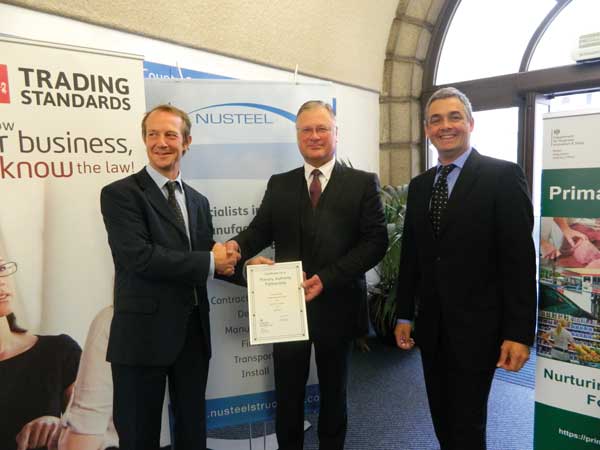News
Contractor gains primary authority agreement

L-R Mike Overbeke, Head of Public Protection, Kent County Council; Ivor Roberts, Managing Director, Nusteel; Steve Rock, Head of Kent Trading Standards Service
Kent-based Nusteel is the first major steelwork contractor to gain a direct partnership with Trading Standards Service via the primary authority route.
“It came about as a response to the requirements of BS EN 1090 and CE Marking. In light of this directive, it was decided to approach the enforcing body for their assistance in developing a compliance plan,” said Nusteel Managing Director Ivor Roberts.
“The plan specifically relates to the traceability of components during the manufacturing process.”
Working in partnership with its primary authority and local regulator, Nusteel gained a unique opportunity to explain its business in detail to a named individual and develop a close working relationship with them.
“We can now rely on the advice provided by our primary authority officer, and on the authority’s interpretation of relevant legal requirements. Provided we follow the advice, we don’t need to worry about responding to conflicting advice or even facing enforcement action from another local authority that has a different interpretation of the law,” added Mr Roberts.
What is primary authority?
- Primary authority is a statutory scheme, established by the Regulatory Enforcement and Sanctions Act 2008, that offers businesses operating across council boundaries the opportunity to be regulated in a new way.
- It enables a business to form a legally-recognised partnership with a single local authority. The primary authority can provide the business with regulatory advice, which other local authorities will take into account in their dealings with that business.
- The process was introduced by the government in 2009 to address concerns raised by businesses about how they are regulated by local authorities in areas such as environmental health, licensing and trading standards legislation.
- The government is committed to developing primary authority and sees the scheme as playing a key role in its work to improve the way that regulations are enforced.










